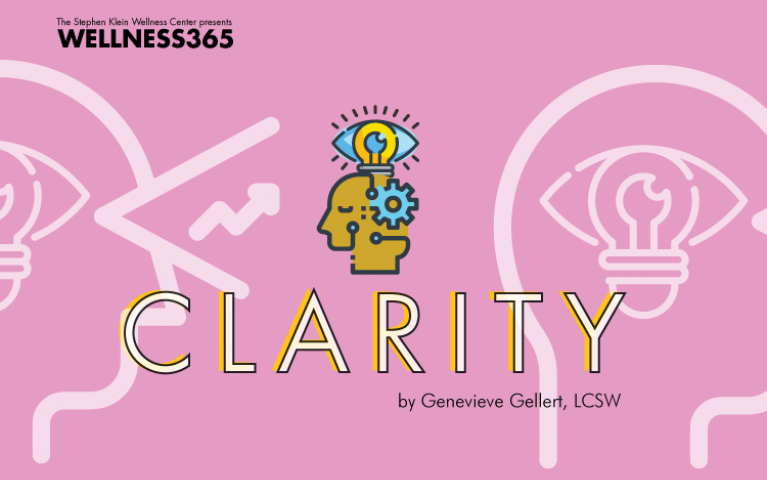Wellness365: Clarity

2020 is not only the calendar year but is also a reference to visual acuity-- the clarity of sharpness of vision measured at a distance of 20 feet. This new year made me pause to reflect on how I could enhance my clarity of the vision I have for my growth, and how I could support others in enhancing their own.
I love and appreciate the fresh start, spirit of renewal, and the literal new beginning Jan 1 brings to the calendar year. I want to mindfully recognize that this transition also brings with it often a sense of pressure, performance, grief, nostalgia, and sadness.
It is important to recognize that December 31 is not the only celebration of the New Year– as there many different cultures and religions that follow different calendars, which use different dates to mark such a transition.
Further, I find resolutions to be tricky and at times emotionally dangerous. I strongly discourage the idea that we need to embrace the “be better” or the “new year, new you” sentiments. Instead, I encourage us to “be as different as we feel we need or want to be,” “to be enhanced,” or “to be open to growth.”
We are all works in progress, all the time. The danger in the language of “be better” or “new you” sentiments that New Year’s resolution articles tend to support implies that we are innately flawed and inadequate. That’s so not true.
We all deserve to make commitments to ourselves focused on our health, wellness, and maturation.
My frustration with New Year’s resolutions as popular media currently promotes them rests further in the fact that resolutions are goals, but without proper care goals can easily turn into empty platitudes or paths of self-deprecation and disappointment – none of which are good for our mental health.
As a Behavioral Health Consultant at Stephen Klein Wellness Center, I spend a lot of time creating SMART goals with patients—goals that are specific, measurable, attainable, relevant, and time-based. The research tells us that if goals are “SMART” than we have the greatest degree of success in achieving them.
An example of a goal that is too broad is, “I want to exercise more to improve my health.” To translate this into a SMART goal, one version could be: “I will go to my local YMCA’s Zumba class every other Monday evening.”
Decades of research have uncovered the positive benefits of goal-setting—including but not limited to improving our self-image, making us aware of our strengths and opportunities for growth, giving us a sense of past victories and providing a stimulus for present successes, helping us to visualize, forcing us to set priorities, defining reality, enabling sharp decision-making, and empowering us to manage our own destiny.
Resolutions often fall short, then, because culturally we conflate the concept of a SMART goal with a philosophical or spiritual intention for self-healing and growth.
To remedy this, for years I’ve practiced the following ritual to anchor my self-reflected path for growth. This is a system that works year-round, especially at the start of the New Year—whichever calendar(s) we observe.
Relying on my grit, which Dr. Angela Duckworth defines as perseverance and passion for long-term goals, I break New Year’s resolutions down into three-parts: theme-setting, intention-setting and goal-setting. I limit my intentions from one to three per year, to make them more manageable and attainable.
Clarity is as important to setting goals, as it is to achieving them. Setting goals that are clear and specific eliminate the confusion that occurs when a goal is set in a more generic manner.
For example, in 2020, I will embrace the theme of clarity by intending do three things: 1. to not shrink for the comfort of others, 2. to learn new things, and 3. to maintain my self-care plan.
I have one SMART goal per intention. They are: 1. when I feel slighted or hurt, speak up every time for what I need and how I feel in the moment, regardless of who I am talking to, 2. complete my Registered Yoga Teacher Training, which has a predetermined schedule and deadlines, in July, and 3. follow my self-care schedule which includes a variety of SMART goals- like daily mindful movement and scheduled hobbies.
Below is a self-care plan template that we can use in our daily personal and professional lives, and this is a template that we encourage staff at Stephen Klein Wellness Center to use. I encourage you to journal, talk with a trusted friend, mentor and / or therapist, and / or meditate to reflect further on self-care needs and new year intentions.
I wish for each of you the clearness and clarity of heart, mind, and spirit to embrace the fullness of the year ahead with strength and as much compassion as possible.